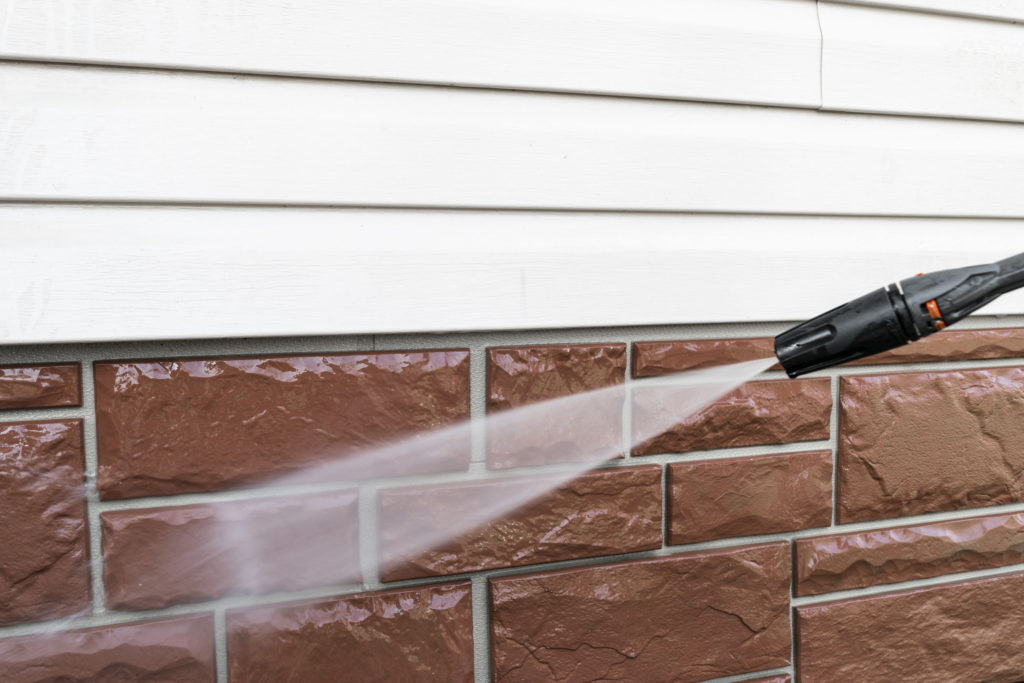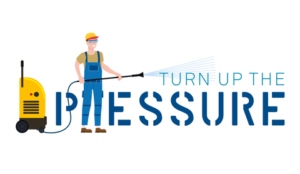Pressure washers come in a myriad of shapes, sizes, and ability to clean depending on their PSI. Some come with a specific PSI level that dictates how much water comes out and how fast.
Depending on the type of pressure washer, it will either be an all-in-one variable that adjusts the pressure with a twist of the wand, or comes with a set of nozzles that put out water at a certain angle and either increase or decrease speed.
However, it’s not just a simple yes or no answer when it comes to pressure. Purchasing the right pressure washer for your project and making sure it has the appropriate amount of PSI will help in making the job easier and go by more quickly.
What is PSI
PSI stands for pounds per square inch; GPM stands for gallons per minute. The thing about PSI and GPM is it is what determines how much water is coming out of the pressure washer at any given minute. Depending on whether you pick a gas or electric, gas pressure washers usually put out 2,000 to 2,800 PSI, whereas electric washers tend to put out 1,300 to 1,700 PSI. The best pressure to clean off extreme dirt and filth is between 1,800 to 2,000 PSI, which is usually about 1 to 1.5 gallons per minute. The amount of water coming out is what determines the duration of a project, as the strength of the stream will help in softening the filth it cleans. Again, it depends on the type of job the pressure washer is being used for. The faster the water moves through the pressure washer, the quicker the job can be done.
Can PSI be Adjusted on a Pressure Washer
On some pressure washers, there are nozzles that come with the washer that can make it easier to clean without having to scrub. However, for those that don’t come with nozzles, sometimes you can just step closer to the project in order to increase the pressure on the project. It’s the same as if you’re running through a sprinkler; the closer to the center, the more pressure there is. It’s good to make note that when stepping closer and increasing pressure, it can strip away paint or siding if the point of water is centrally focused on a specific point for too long.
An option that you can purchase to add on to your pressure washer is a Vario Power Spray (VPS) wand, which can help to increase the speed of water coming out. You can adjust from high to low pressure with a twist. Depending on which model you choose, some VPS wands automatically dispense detergent at low pressure. This wand makes it easier rather than having to switch between nozzles in order to find the best water pressure.
What Do Pressure Washer Nozzles Do
Pressure washer nozzles is what dictates the amount of pressure coming out of your hose. The size of the hole in the nozzle is what does the constricting, creating more speed, which in turn is what makes for high or low pressure depending on the nozzle size. So, how many sizes are there? There are five different types of pressure washer nozzles.
The zero-degree nozzles is a straight shot of water, and will clean effectively. It pinpoints the muck and cleans it easily because it is focused. It does not fan out at all. This nozzle is not used as often because it is just a central point of water that doesn’t fan out to clean. It will more than likely just put a hole in anything you try to clean.
The fifteen-degree nozzle is just that, fifteen degrees, which might come as a shocker to some of you. This is a wider sheet of water, so once it hits the surface, it will be less harsh and be able to cover a small area without the harsh scrubbing. It helps to strip away dirt quickly.
The next nozzle is twenty-five degrees, and is another nozzle that fans water out rather than being a pinpoint. This nozzle is perfect for lifting off stuck on dirt with a wider fan. However, the wider the fan of water gets, the less pressure it will have.
The forty-degree nozzle is the gentlest spray of water compared to the others. Because of its light pressure, it can be used to clean more delicate projects, such as windows on a car or home.
The last nozzle is a sixty-five-degree nozzle, which is mainly used for soap. It’s the widest angle for a spray of water, which helps getting soap everywhere for a simpler job.
Each nozzle is color coded so you don’t have to tell which is which. More often than not, the zer-degree nozzle is red, the fifteen-degree is yellow, the twenty-five degree is green, the forty degree is white, and the sixty-five degree is black.

Why Would My Pressure Washer Lose Pressure
It is not uncommon that a pressure washer will lose pressure over time. Whether you’re pressure washer is old, using the wrong nozzles, or the hosing is bad, there are a few reasons as to why you may be experiencing a loss in pressure when cleaning. There are a few common reasons as to why this may happen and here is how you might be able to fix it.
One of the most common reasons you’ll notice a loss of pressure is the nozzle has come loose at the end, or it has also become plugged. If you use the same nozzle over an extended period of time, then the nozzle is likely to become loose from the amount of pressure it experiences from the water. It can also become clogged from soap or debris that has built up within the wand or nozzle itself.
Another reason you may be experiencing a loss of pressure is that there is a built up of soap within the hosing of the pressure washer. If you’re not using the proper detergent for your pressure washer, then it may be experiencing some blockages from excess detergent blocking the water’s way out. It’s important to wash out the pressure washer with water once you’re done using it.
Pressure can also decrease if there is not proper filtration in your pressure washer. If there are abrasive materials in the pump, or big bubbles, then it will be hard for water to get around those in order to maintain adequate water pressure. The best way to fix this is with a new filter, and those aren’t incredibly expensive to fix.
Make sure to clean out all of your parts when using your pressure washer. One of the worst things to deal with is dirty parts that are clogged from dirt and detergent. After using your pressure washer each time, make sure to clean all of the parts; consider running straight water through the pressure washer as well as cleaning them by hand afterwards to make sure they won’t get damaged and become useless.
One more thing to look out for is the relief valve. It can get stuck, partially plugged by contaminants, or the valve seat may be stuck down. A relief valve is basically what helps it from overheating. It should automatically reset on its own, but it can get stuck from dirt. It could just need to be cleaned off. However, if the relief valve leaks, it could mean that there is a blockage in the heating coil. If it continues to leak, it will have to be replaced.
Using the Correct Detergents
The best way to keep pressure washers from getting backed up and losing pressure is by using the proper detergents. Without using the proper detergents, then the nozzles will get filled with leftover detergent that gets caked and will become molded and can ruin parts of the pressure washer. It’s totally fine to occasionally use alternative detergents such as Dawn dish soap, or even bleach if absolutely necessary, but those aren’t designed for pressure washers nor do they get the job done as good as detergents. Some great brands of detergents that can be found are Simple Green and Purple Power Heavy-Duty. There are other brands out on the market, and they are certainly better for your pressure washer and it’s longevity.
Difference Between Electric and Gas Pressure Washers
Both electric and gas serve the same purpose, the only difference is PSI. As stated earlier, electric pressure washers have a little less PSI than a gas pressure washer, and that is based on their construction. Gas pressure washers are able to clean more effectively because their PSI is higher, which means they are perfect for cleaning harder projects such as homes, cleaning outdoor patios or driveways, and things such as that. However, the few minor downfalls of a gas powered pressure washer is that it is incredibly noisy because of the fast pressure, as well as it can be dangerous because of the high speeds of pressure. The minor downfall of electric power washers is that they are tied to the house. An extension cord can be used, but its still going to be tied to an outlet, which can be a downfall for some.
